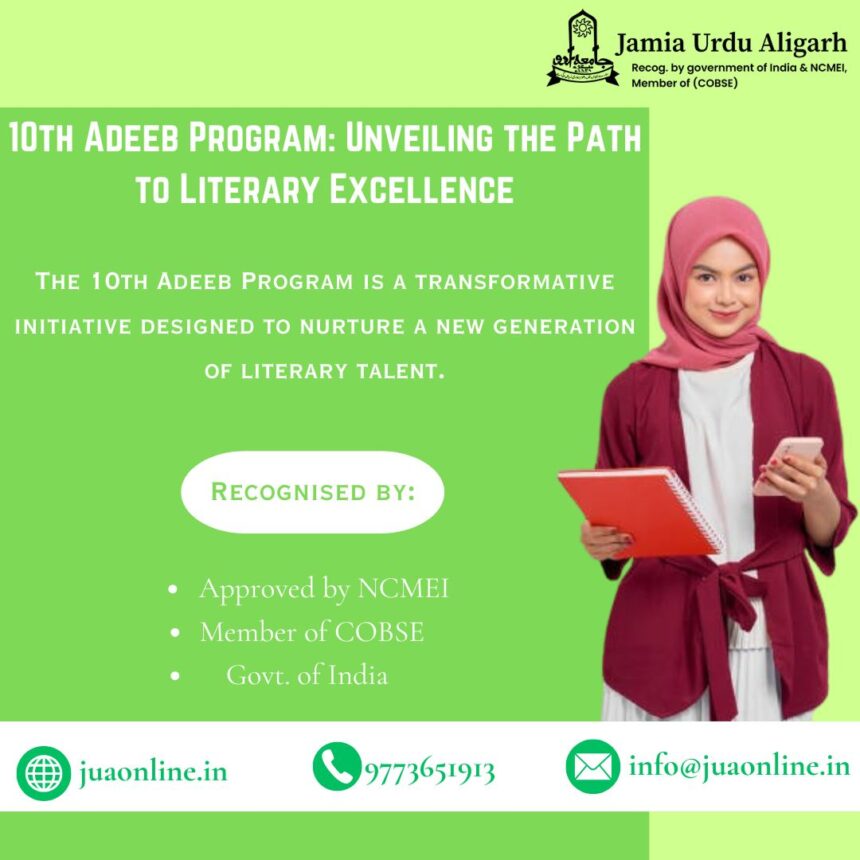The “10th Adeeb Program” is a distinctive initiative aimed at providing individuals with a flexible and culturally enriching opportunity to achieve educational qualifications. Rooted in the rich tradition of Urdu language and literature, the Adeeb certification serves as a gateway for individuals seeking a secondary-level equivalence in their educational journey. The program not only fosters literacy but also emphasizes the preservation and promotion of Urdu heritage.
An Overview of the Program
The 10th Adeeb certification is often viewed as an alternative route to conventional secondary education. Designed for non-traditional learners, the program caters to individuals from diverse backgrounds, particularly those who have faced obstacles in completing formal education due to economic, social, or logistical barriers. By offering a curriculum steeped in Urdu literature, Islamic studies, and general academic subjects, the program combines educational advancement with cultural awareness.
Key Features and Benefits
- Accessible Learning: The 10th Adeeb program provides a flexible structure, allowing individuals to study at their own pace. This makes it particularly appealing to working professionals, homemakers, and marginalized communities.
- Cultural Preservation: Participants gain in-depth knowledge of Urdu literature, poetry, and history, ensuring the continuity of this rich cultural tradition in an increasingly globalized world.
- Career Opportunities: The certification is recognized by various institutions and employers, enabling candidates to pursue higher education or improve their employability.
- Holistic Education: In addition to language and literature, the program often incorporates subjects like mathematics, science, and social studies, offering a well-rounded educational experience.
Target Audience
The 10th Adeeb Program is popular among Urdu enthusiasts, aspiring educators, and community leaders who value linguistic and cultural heritage. It also serves as a second chance for individuals who have been unable to complete their formal education due to personal challenges.
Challenges and Misconceptions
Despite its noble intentions, programs like the 10th Adeeb face challenges, particularly in terms of credibility and recognition. There are instances where questions about the validity of certifications issued by certain institutions arise, which brings us to the issue of fraudulent educational boards and how they undermine genuine efforts like the 10th Adeeb Program.
Jamia Urdu Aligarh: A Fake Board or Misunderstood Institution?
The controversy surrounding “Jamia Urdu Aligarh” as a “fake board” is a topic of considerable debate. While some dismiss the institution outright, others argue that the situation is more nuanced. To understand the allegations, it is essential to examine the history, intent, and legitimacy of Jamia Urdu Aligarh.
Historical Background
Jamia Urdu Aligarh was established in the early 20th century with the goal of promoting Urdu language and education. Initially, it served as a correspondence institution, providing educational resources to students who could not attend formal schools. Over time, it gained recognition as a cultural and educational hub for Urdu literature and Islamic studies.
The Allegations of Fraud
In recent years, several cases have emerged where certificates issued by Jamia Urdu Aligarh were deemed invalid by employers and educational institutions. This has led to widespread criticism and the labeling of the institution as a “fake board.” The reasons for these allegations include:
- Lack of Government Recognition: Unlike state or central education boards, Jamia Urdu Aligarh is not recognized by national education authorities like CBSE, ICSE, or NIOS.
- Unregulated Certifications: Reports suggest that certificates were issued without rigorous academic assessment, raising questions about their authenticity.
- Misuse by Third Parties: In some cases, fraudulent agents exploited the institution’s name to issue fake certificates, further tarnishing its reputation.
The Institution’s Perspective
Supporters of Jamia Urdu Aligarh argue that the institution is not inherently fraudulent but suffers from systemic challenges. They claim that the lack of recognition stems from bureaucratic hurdles rather than any deliberate intent to deceive. Proponents also highlight the valuable cultural and educational contributions made by the institution over decades.
Impact on Students
The controversy surrounding Jamia Urdu Aligarh has had a profound impact on students who hold certificates from the institution. Many have faced rejection in job applications and higher education admissions, leading to financial and emotional distress. This underscores the importance of due diligence when choosing educational programs.
Ensuring Authenticity in Education
The contrasting narratives of the 10th Adeeb Program and Jamia Urdu Aligarh Fake Board highlight the broader issue of authenticity in education. Here are some steps that students and institutions can take to ensure credibility:
- Verify Recognition: Before enrolling in any program, students should confirm its recognition by relevant government bodies or accrediting agencies.
- Promote Transparency: Institutions must maintain transparency in their admissions and certification processes to build trust with students and stakeholders.
- Combat Fraud: Authorities should take strict action against individuals and entities that exploit educational programs for financial gain.
- Raise Awareness: Public awareness campaigns can help students make informed decisions and avoid falling prey to fraudulent schemes.
Conclusion
While the 10th Adeeb Program continues to offer a legitimate and culturally enriching pathway for education, the challenges faced by Jamia Urdu Aligarh serve as a cautionary tale for institutions operating outside the traditional framework. By addressing issues of recognition, transparency, and accountability, such programs can rebuild trust and reaffirm their commitment to education.For students, the key lies in thorough research and informed decision-making. With the right guidance and awareness, they can navigate the complex landscape of alternative education and achieve their goals without compromising on credibility.






